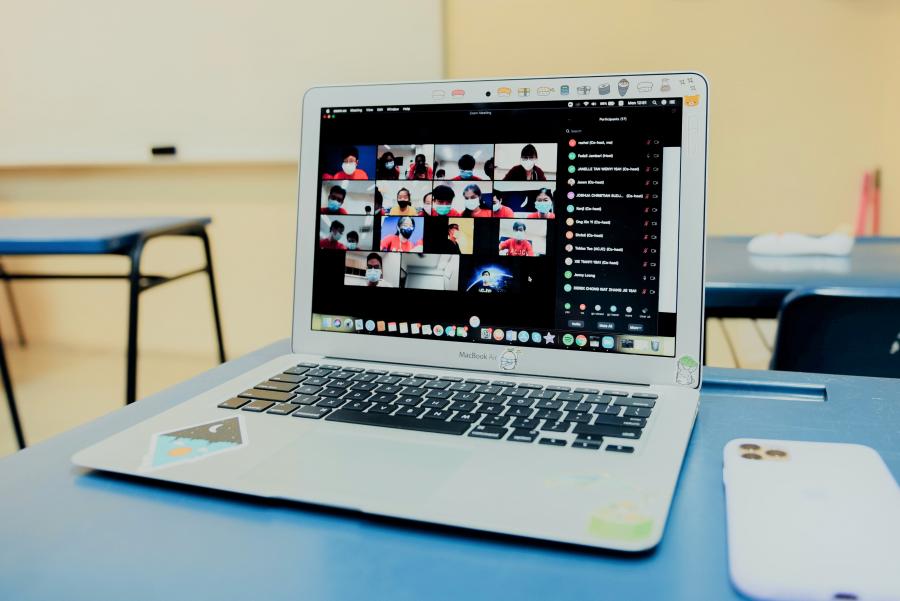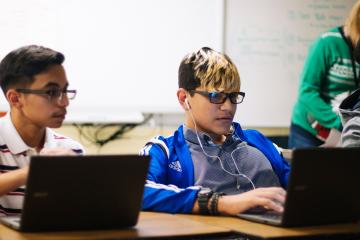
Until last year, unequal access to digital learning was most often linked to the “homework gap” wherein students who lacked computers and reliable Internet did not have the means to complete their increasingly online-based coursework and struggled to keep up with their peers. Fortunately, they could rely on the school day for in-person education – until COVID-19 hit.
Schools across the country are still partially or fully virtual with no clear answers on when they’ll be able to fully reopen. The pre-pandemic homework gap for the millions of children who lacked access to digital learning was already a major concern for educators and parents. Now, a generation is at risk of falling permanently behind.
As we shared in our Deepening Digital Divide post last fall, students of color and from low-income families have been disproportionately affected. One in three Black, Latino, and Native American families does not have high-speed Internet and the same is true for families earning less than $50,000, according to the Alliance for Excellent Education. In rural areas, the number stands at two in five.

That’s why this Digital Learning Day is more important than ever. Digital equity in education is no longer a “nice to have” – if it ever was – but an unquestionable essential. So how do we make it a reality? What can the private sector do to ensure today’s students have access to quality education and the professionals of tomorrow are set up for success?
For starters, companies can partner with education nonprofits on skills-based volunteering projects to build their technology capabilities and increase their capacity to support more students. By connecting the talent, resources, and tech know-how of corporations with the nonprofits and educators on the ground, we can create powerful solutions to close the digital divide and promote learning equity. At Common Impact, exploring how pro bono can be part of the solution for digital inclusion is a priority for us this year – and not just for education, but also workforce development, healthcare, housing, and more.
Interested in learning more about how your company or nonprofit can leverage skills-based volunteering for digital learning and inclusion? We’d love to hear from you!
Here’s how some of our nonprofit partners in the education and digital inclusion space have overcome operations challenges and scaled their work thanks to skills-based volunteering!
The Clubhouse Network empowers young people from underserved communities to develop new skills, explore their ideas, and build confidence in themselves through the use of technology. In September 2020, the Clubhouse partnered with a skilled volunteer team of marketing professionals to develop a strategy for expanding and strengthening their Alumni Network. Together, they created an integrated marketing plan incorporating social media, advertising, and data management that will enable the Clubhouse to establish its Alumni Network brand, continuously expand membership, and increase long-term engagement. As a result of this project, more current and former Clubhouse participants will have access to valuable resources for academic and professional learning, including resume building, job search and hiring support, and international and intergenerational networking.
Urban Ed provides children, youth, and adults with technology-driven education, information, and skill development for sustained futures. Last year, the DC-based nonprofit engaged Common Impact’s one-hour pro bono hotline to access rapid response support for their 20th anniversary gala. Urban Ed had originally targeted a 200-person event with a fundraising goal of $250,000, but given COVID-19 concerns, they had to decide whether to cancel the September 2020 gala, hold the flagship event virtually for the first time, or reschedule it for 2021. A team of two skills-based volunteers with expertise in technology and digital events answered Urban Ed’s questions about possible platforms, costs, and existing success stories to help them assess the viability of the different location and timing scenarios and how to host a virtual event of this nature. Because of the hotline call and continued collaboration with their corporate volunteers, Urban Ed was ultimately able to make an informed decision to hold the gala virtually in Spring 2021, giving them a pandemic-safe opportunity to share their recent accomplishments and raise money for technology education and digital learning programming.


